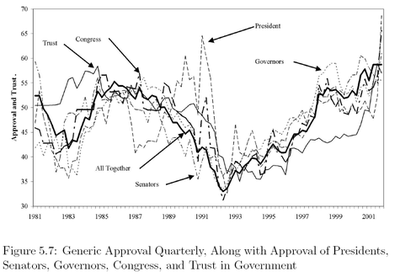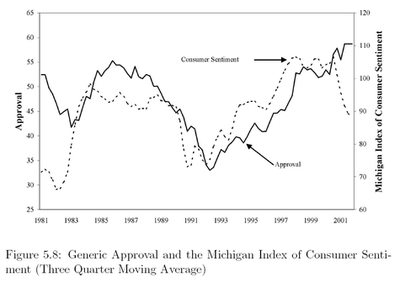Friday Poll Watch: Did Southern whites ever give Obama a chance?
NOTE: I'm back from a family funeral in South Carolina. Thanks to my colleague Sue Sturgis for holding down the fort in my absence.
 It's time for another Friday Poll Watch -- here are some interesting numbers I've run across lately:
It's time for another Friday Poll Watch -- here are some interesting numbers I've run across lately:
DID SOUTHERNERS EVER GIVE OBAMA A CHANCE?
It's a point we've made before, but the latest DailyKos/Research 2000 weekly tracking poll drives it home: Obama is a popular president -- just not in the South.
According to the poll, Obama has had net positive approval ratings every month he's been in office in the North, Midwest and West.
But in the South, Obama barely had time to change the drapes in the White House before his net approval ratings went into negativeterritory. By early March 2009, just two months after his inauguration, Obama's net approval went below zero in the Southern region.
Obama's net approval in the South had sunk to a staggering net -40 points in August 2009 -- still a mere eight months since his inauguration. It's stayed there ever since.
Given that over 95% of African-Americans nationally still approve of Obama's performance, the vast majority of Obama's rapidly-declining fortunes in the South can be chalked up to one demographic: Southern whites.
Many Southern whites didn't like Obama to begin with. For example: In 2008 exit polls, over 14% of Louisiana voters openly said Obama's race was a "factor" in voting against him -- and that was in a state where more whites are Democrats than Republicans.
But it's notable that, as of January 2009, despite losing two-thirds of the Southern Electoral College vote, the president still had a +30 net approval in the South. Just two months later, the good will had mostly faded; by summer, it had entirely vanished and turned into fierce opposition.
Maybe Southerners were just putting on a show when they gave Obama a thumbs-up to pollsters at the beginning; maybe they sincerely were hopeful he'd bring change.
Either way, it's clear that white Southerners didn't give Obama much of a chance, and were comfortable to openly turn against him just weeks after he settled into office.
For more on this topic, see part 2: Southern whites and Obama: What about North Carolina?
IT REALLY IS THE ECONOMY
Pollsters make their living telling us about week-to-week horse races and the rise and fall of politicians. But The Monkey Cage points to research by Jim Stimson (via Ezra Klein) reminds us that this isn't how everyday people see the world.
Stimson has two excellent charts: The first shows that the public's view of the President, Congress and even governors all trend together -- in other words, when things aren't going well, people get frustrated with government in general, not just one or other party or piece of government.

So what causes the public to approve or disapprove of government? The economy, as chart two shows:

It's not a perfect correlation, but it's pretty tight -- the only time the pattern didn't hold was after 9/11, for obvious reasons.
What does this mean? That the public will have a better perception of government in general -- including its component pieces of Obama and sitting lawmakers in Washington and at the state level -- if and when the economy improves.
FICKLE MILLENNIALS?
The Millennial Generation -- the 18-29 age group -- were a big part of Obama's victory and the Democratic resurgence in 2006-2008. But as economic troubles continue and high hopes are tempered, Pew finds the strong pro-Democratic lean of younger voters is softening:
Short-term, however, it's clear this adds to the already mounting problems for Democrats in 2010.
QUICK TAKES
* MEET THE FLINSTONES: Majority of Texans don't believe in evolution.
* NC <3 GAYS IN MILITARY: Majority in military-friendly North Carolina OK with gays serving openly in military, support repeal of Don't Ask, Don't Tell.
* HOW BIG IS THE PARTY? The Tea Party, that is -- estimates of national support range up to 18%.
 It's time for another Friday Poll Watch -- here are some interesting numbers I've run across lately:
It's time for another Friday Poll Watch -- here are some interesting numbers I've run across lately:DID SOUTHERNERS EVER GIVE OBAMA A CHANCE?
It's a point we've made before, but the latest DailyKos/Research 2000 weekly tracking poll drives it home: Obama is a popular president -- just not in the South.
According to the poll, Obama has had net positive approval ratings every month he's been in office in the North, Midwest and West.
But in the South, Obama barely had time to change the drapes in the White House before his net approval ratings went into negativeterritory. By early March 2009, just two months after his inauguration, Obama's net approval went below zero in the Southern region.
Obama's net approval in the South had sunk to a staggering net -40 points in August 2009 -- still a mere eight months since his inauguration. It's stayed there ever since.
Given that over 95% of African-Americans nationally still approve of Obama's performance, the vast majority of Obama's rapidly-declining fortunes in the South can be chalked up to one demographic: Southern whites.
Many Southern whites didn't like Obama to begin with. For example: In 2008 exit polls, over 14% of Louisiana voters openly said Obama's race was a "factor" in voting against him -- and that was in a state where more whites are Democrats than Republicans.
But it's notable that, as of January 2009, despite losing two-thirds of the Southern Electoral College vote, the president still had a +30 net approval in the South. Just two months later, the good will had mostly faded; by summer, it had entirely vanished and turned into fierce opposition.
Maybe Southerners were just putting on a show when they gave Obama a thumbs-up to pollsters at the beginning; maybe they sincerely were hopeful he'd bring change.
Either way, it's clear that white Southerners didn't give Obama much of a chance, and were comfortable to openly turn against him just weeks after he settled into office.
For more on this topic, see part 2: Southern whites and Obama: What about North Carolina?
IT REALLY IS THE ECONOMY
Pollsters make their living telling us about week-to-week horse races and the rise and fall of politicians. But The Monkey Cage points to research by Jim Stimson (via Ezra Klein) reminds us that this isn't how everyday people see the world.
Stimson has two excellent charts: The first shows that the public's view of the President, Congress and even governors all trend together -- in other words, when things aren't going well, people get frustrated with government in general, not just one or other party or piece of government.


It's not a perfect correlation, but it's pretty tight -- the only time the pattern didn't hold was after 9/11, for obvious reasons.
What does this mean? That the public will have a better perception of government in general -- including its component pieces of Obama and sitting lawmakers in Washington and at the state level -- if and when the economy improves.
FICKLE MILLENNIALS?
The Millennial Generation -- the 18-29 age group -- were a big part of Obama's victory and the Democratic resurgence in 2006-2008. But as economic troubles continue and high hopes are tempered, Pew finds the strong pro-Democratic lean of younger voters is softening:
The Democratic advantage over the Republicans in party affiliationamong young voters, including those who "lean" to a party, reached awhopping 62% to 30% margin in 2008. But by the end of 2009 this32-point margin had shrunk to just 14 points: 54% Democrat, 40%Republican.But Pew adds that "this age group continues to favor the Democratic Party more than doother generations." And while it's hard to chart the political identity of a generation -- if for no other reason because a person's views will evolve as they get older -- Pew also argues that "the underlying political values of this newgeneration continue to be significantly more liberal than those ofother generations on many measures."
Short-term, however, it's clear this adds to the already mounting problems for Democrats in 2010.
QUICK TAKES
* MEET THE FLINSTONES: Majority of Texans don't believe in evolution.
* NC <3 GAYS IN MILITARY: Majority in military-friendly North Carolina OK with gays serving openly in military, support repeal of Don't Ask, Don't Tell.
* HOW BIG IS THE PARTY? The Tea Party, that is -- estimates of national support range up to 18%.
Tags
Chris Kromm
Chris Kromm is executive director of the Institute for Southern Studies and publisher of the Institute's online magazine, Facing South.
